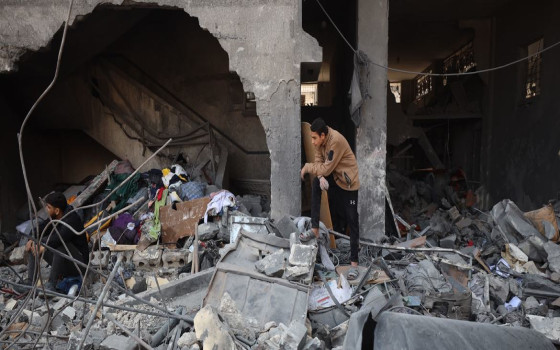
Daily suffering for displaced people in Gaza amidst the closure of crossings and scarcity of aid. UN Secretary-General: Gaza has become a killing field, and we will not participate in measures that do not respect humanity and neutrality.

- Europe and Arabs
- Wednesday , 9 April 2025 8:29 AM GMT
Gaza - New York: Europe and the Arabs
UN officials have called on world leaders to act – forcefully, quickly, and decisively – to ensure respect for the fundamental principles of international humanitarian law, as the tightened Israeli blockade of Gaza continues for a second month.
UN Secretary-General Guterres stated that Israel, as the occupying power, has clear obligations under international law. Under the Fourth Geneva Convention, the occupying power must ensure food and medical supplies for the population, maintain medical facilities and services, hospitals, public health, and sanitary conditions in the occupied territory, and approve and facilitate relief plans by all means at its disposal – if adequate supplies are not available to all or part of the population in an occupied territory. Guterres stressed that the time has come to end the dehumanization of civilians, protect them, release hostages, ensure access for life-saving aid, and resume a ceasefire. According to the UN daily news bulletin, a copy of which we received on Wednesday morning, the UN Secretary-General said that more than a month has passed without a drop of aid entering Gaza, and "as aid runs out, the Pandora's Box is reopening." He stated that the Gaza Strip has become a killing field, and that civilians are trapped in an endless cycle of death. In press statements at UN headquarters, António Guterres said that UN agencies and their partners are ready and determined to provide relief. However, he added that the newly proposed "approval mechanisms" proposed by the Israeli authorities regarding aid delivery threaten to impose further control over aid and drastically reduce it "down to the last calorie and corn flour." Guterres said, "We will not participate in any measure that does not fully respect the fundamental principles of humanity, impartiality, independence, and neutrality. Unhindered humanitarian access must be ensured, and all humanitarian workers must be afforded the protection they are entitled to under international law."
The Secretary-General emphasized the need to respect the inviolability of UN premises and assets. He again called for an independent investigation into the killing of humanitarian workers, including UN staff.
At least 408 humanitarian workers, including more than 280 from UNRWA, have been killed in Gaza since October 2023.
"I would like to say a special word about those heroic humanitarian workers in Gaza," said Secretary-General António Guterres. "They are under fire, but they are doing everything they can to continue on their chosen path—to help people."
The Secretary-General noted the recent ceasefire, including the release of hostages and the distribution of life-saving aid. He added, "For weeks, the guns fell silent, the obstacles were removed, the looting ended, and we were able to deliver life-saving supplies to virtually all parts of the Gaza Strip. All of this ended with the collapse of the ceasefire. Hope was dashed for Palestinian families in Gaza and for the families of the hostages in Israel, as I was reminded of when I met again with the families of the hostages yesterday."
The Secretary-General reiterated his call for the immediate and unconditional release of all hostages, a permanent ceasefire, and full humanitarian access.
The Secretary-General stressed the need for complete clarity on the current situation, stating that the claims that there is sufficient food in Gaza to feed all Palestinians in the Strip are far from the reality on the ground.
According to the UN News Bulletin, displaced Palestinian Ahmed Al-Kafarneh sat inside his tent next to one of his young sons in central Gaza, pondering how to provide for himself and his family after "life has become so difficult due to the closure of crossings into Gaza, the shortage of flour, and the closure of bakeries." Al-Kafarna, a person with special needs, was displaced with his family from Beit Hanoun in the northern Gaza Strip to Gaza City. He told a UN News correspondent in Gaza that he can barely provide his children with one meal a day, "and sometimes I make them go to bed early because there is no food." As for drinking water, according to Ahmed, there is no source of clean water, except on rare occasions when trucks arrive carrying water. He added, "As for medicines and hygiene items, we don't have them at all."












No Comments Found